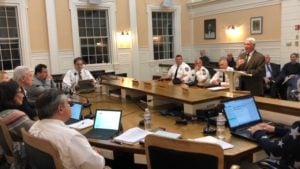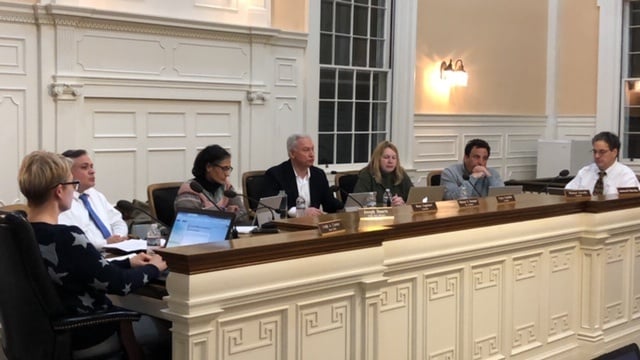By Elizabeth F. McNamara
The Town Council voted 4-0 Monday night in favor of a resolution seeking permission from the General Assembly to move to a tiered tax rate. Council President Mark Schwager was absent.
Traditionally, East Greenwich has kept tax rates for residential, commercial/industrial and tangible property* the same ($23 per $1,000 assessed value for all categories this year).
By state law, municipalities can only consider tiered tax rates in a revaluation year. East Greenwich does revaluations every three years, the last one in 2018, so it would need General Assembly approval to move to tier designations this year. The vote Monday does not change EG policy toward tax rates, Council Vice President Mike Donegan said. Instead, it gives the council permission to consider making such a change, should the General Assembly grant approval.
Donegan sees moving to a tier tax rate as aiding residents.
“I don’t see how that’s fair to residents,” he said of the current system. He used the example of National Grid, which has $18 million worth of tangible property in East Greenwich. If that was taxed at, say, $33 instead of $23, the town would get an additional $180,000 that could be used to offset residential rates.
In 2018, 22 out of Rhode Island’s 36 cities and towns had higher tax rates for commercial/industrial, personal property or both. Find the list here.

Steve Lombardi of the EG Chamber of Commerce.
EG Chamber of Commerce head Steve Lombardi told the council he was speaking on behalf of small businesses in town – which, he reminded them, make up the majority of businesses in town.
“They are very, very concerned about what this could mean to the small business community,” he said.
Donegan and Councilman Mike Zarrella took pains to say they did not want to hurt small business. To that end, the council added a $10,000 personal property exclusion to the resolution, which would protect businesses with $10,000 or less in personal property from a higher tax if the town moved in that direction.
However, nothing will happen unless the state gives its approval. If that happens, the council could take up moving to a tiered tax rate in the course of budget talks this spring during which, Donegan said Monday, residents and business owners would be welcome to express their thoughts. The 2020 budget must be approved by the Town Council by June.
* Personal or tangible property refers to a business’s belongings, including furniture, kitchen ware, machinery and, in the case of National Grid, cables and wires.
Help keep EG News coming! Click on the Donate button below or send a check to EG News, 18 Prospect St., E.G., RI 02818. Thanks!






 Subscribe
Subscribe
“…the example of National Grid, which has $18 million worth of tangible property in East Greenwich. If that was taxed at, say, $33 instead of $23, the town would get an additional $180,000 that could be used to offset residential rates.”
This is a question that always comes into my noodle when such matters arise: who pays the taxes assessed to National Grid properties? For example, say the Town billed the Police Department for the use of the Taj Mahal. I know it’s silly but just answer the question. Okay. Don’t. I’ll do it. The Police Department will have to pay for it. But they don’t have a big enough budget to afford it so they go to the town for assistance. Who..is the town? You, me, we! Every electric bill you pay helps National Grid pay for the poles and land under the poles that get the electricity to your TV sets. National Grid is not a charity. It’s a utility corporation. When a wire goes down in a storm, National Grid comes to put it back up. When someone knocks down a pole, National Grid comes to put it back up. And now the Town wants to tax National Grid another ten bucks a thousand?? Residential units will pay their share, one way or another. The answer is face up and tax responsibly or spend responsibly.
No one wants their taxes to increase, but there is only so much fat to cut. We have to pay for the things that make our town so desirable. This option takes into account small business owners, who would be exempt up to a certain dollar amount, and targets businesses that earn more.
Donegan gave a good example at the TC meeting — the Texas Roadhouse and Outback restaurants on Route 2 . One is in Warwick and pays $31 per $1,000, one is in EG and pays $23 per $1,000. (Warwick’s residential rate is $20.80, our is the same $23). That is a significant difference.
One revenue generator is raising the local meals & beverage tax. EG benefits substantially from the 1% levy on diners, climbing from just under $500,000 in 2013 to nearly $750,000 in 2018. East Greenwich has a become a dining destination – one of the top three in the state. An additional .5% meal tax could generate another >350k for the town. That amounts to 5 cents for every $100.
We have to find innovative ways to spread the increase over multiple areas so that the residents don’t carry the whole burden. I am glad the TC is looking at different options.
So, what extra or improved services are you getting from this increase in tax revenue? Also, you do realize that increasing overhead costs are just going to be passed to the consumer, correct?
Hi Sherm, well, obviously, I understand that. But it won’t fall strictly on EG tax payers. It will fall equally on everyone who enjoys the nightlife we have in EG – that is supported by fire & police that the EG taxpayer *does* fund. Right now, we are facing stark times. We have to be innovative in meeting these challenges. As I said above, an increase of .5% in the meal tax amounts to 5 cents per $100 on a dining check. Truly, a nominal cost. This would help us to properly fund our schools and pay for all the lawsuits from the last town council (not to mention their poorly negotiated labor contracts.)
Every time you tax a business it gets passed on to the consumer. Just another way for this TC to avoid what really needs to happen which is get the unions and spending under control.
Absolutely correct. Who voted these clowns in.
Let’s see if we can tax small business out of EG!
Someday we might figure out its not a revenue generation problem it’s a spending problem.